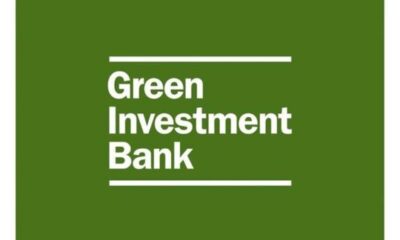

Economy
Commission Calls For Transformation Of Finance System For Sustainable Infrastructure
Global Commission on the Economy and Climate has issued a new report encouraging governments and finance institutions to scale up and move investment for sustainable infrastructure as a fundamental strategy to spur growth.
“Investing in sustainable infrastructure is essential to solve all the world’s most pressing problems,” said Felipe Calderón, former President of Mexico and Chair of the Global Commission. “It’s key to reigniting global growth. It’s key to reducing poverty. And it’s key to meeting the Paris Agreement. Infrastructure can be the pillar on which we build a sustainable economy, or it can crumble beneath us. It all depends on whether we get financing right, only then will capital fully shift in the low-carbon direction.”
The Sustainable Infrastructure Imperative: Financing for Better Growth and Development identifies the main barriers to financing sustainable infrastructure and lays out an action agenda for unlocking the capital required. The report was launched by President Felipe Calderón and Lord Nicholas Stern as well as other Global Commissioners at an event hosted by President Luis Alberto Moreno at the Inter-American Development Bank in Washington, DC.
The report finds that investments totalling about US$90 trillion will be needed in infrastructure over the next 15 years, more than is in place in our entire current stock, even if we continue under business-as-usual development. The good news is that it does not need to cost much more to ensure that this infrastructure delivers a low-carbon economy consistent with the climate goals agreed in Paris, and fuel and other operational savings can fully offset any additional up-front investments.
Meeting these investment needs will require a combination of public and private investment, with public investment used strategically to help crowd-in or leverage further private investment. The report also breaks down future infrastructure needs by sector and country groupings. It finds that the global South will account for roughly two-thirds of investment, with energy and transport sectors dominating.
The report notes that a single infrastructure project can require dozens of financial institutions, all with their own demands, and take more than a decade to build. The cost of project preparation is substantial, typically 2.5–5% of total investment. And the risk-return ratio for sustainable infrastructure is often too high to attract private capital.
The Global Commission identifies four action areas to finance sustainable infrastructure at the scale required:
- Tackle fundamental price distortions through fossil fuel subsidy reform and carbon pricing. Fossil fuel subsidies amounted to around US$550 billion in 2014, skewing investment away from sustainable options.
- Strengthen policy frameworks and institutional capacities. Better planning and governance can ensure the right projects are selected in the first place, and the right financing is used at the right time.
- Transform the financial system through new tools like green bonds and green investment banking, and by greening the existing financial system, including through corporate climate risk disclosure.
- Ramp up investments in innovation and deployment of clean technologies to reduce the upfront costs of sustainable infrastructure.
Lord Nicholas Stern, leading economist and co-Chair the Commission:
The next couple of decades, and particularly the next two or three years, will be critical to the future of sustainable development.
“We can and should invest in and build cities where we can move and breathe and be productive, while protecting the natural world that underpins our livelihoods. We cannot continue with ‘business as usual’ which will lock in high-carbon infrastructure and create further congestion and pollution, while choking off development opportunities, particularly for poor people. This will require not only better policies but also a sea change in the financial system itself to make it fit for purpose for the scale and quality of investment we now need. The development banks, both national and international, should be at the centre of this: the growth story of the future.”
Ngozi Okonjo-Iweala, former finance minister of Nigeria and Commissioner: “Our action agenda in this report knits together sustainable growth with development gains. It makes clear that the role of governments, the private sector, and development banks varies depending on a country’s stage of development. And it’s an especially exciting opportunity for the developing world, where we are just starting to build fundamental infrastructure, to show real leadership thanks to the opportunities to skip over the inefficient, polluting systems of the past.”
Caio Koch-Weser, former Vice Chairman of Deutsche Bank and Commissioner: “Green finance and climate risk are two sides of the same coin. The finance sector is increasingly grasping the opportunity side of the low-carbon transition. But any prudent investor looks not only at the opportunities in the portfolio, but also the risks, especially of legacy investments. Clear definitions of what counts as green on the one hand, and transparency requirements concerning carbon risk on the other hand would allow informed investment decisions and help ensure an efficient and smooth low-carbon transition.”
At the report launch on 6 October 2016, the IDB also launched NDC Invest, a one-stop shop for countries to transform their national commitments into investment plans.


 Features11 months ago
Features11 months agoEco-Friendly Cryptocurrencies: Sustainable Investment Choices

 Energy11 months ago
Energy11 months agoThe Growing Role of Solar Panels in Ireland’s Energy Future

 Energy10 months ago
Energy10 months agoGrowth of Solar Power in Dublin: A Sustainable Revolution

 Energy10 months ago
Energy10 months agoRenewable Energy Adoption Can Combat Climate Change




























